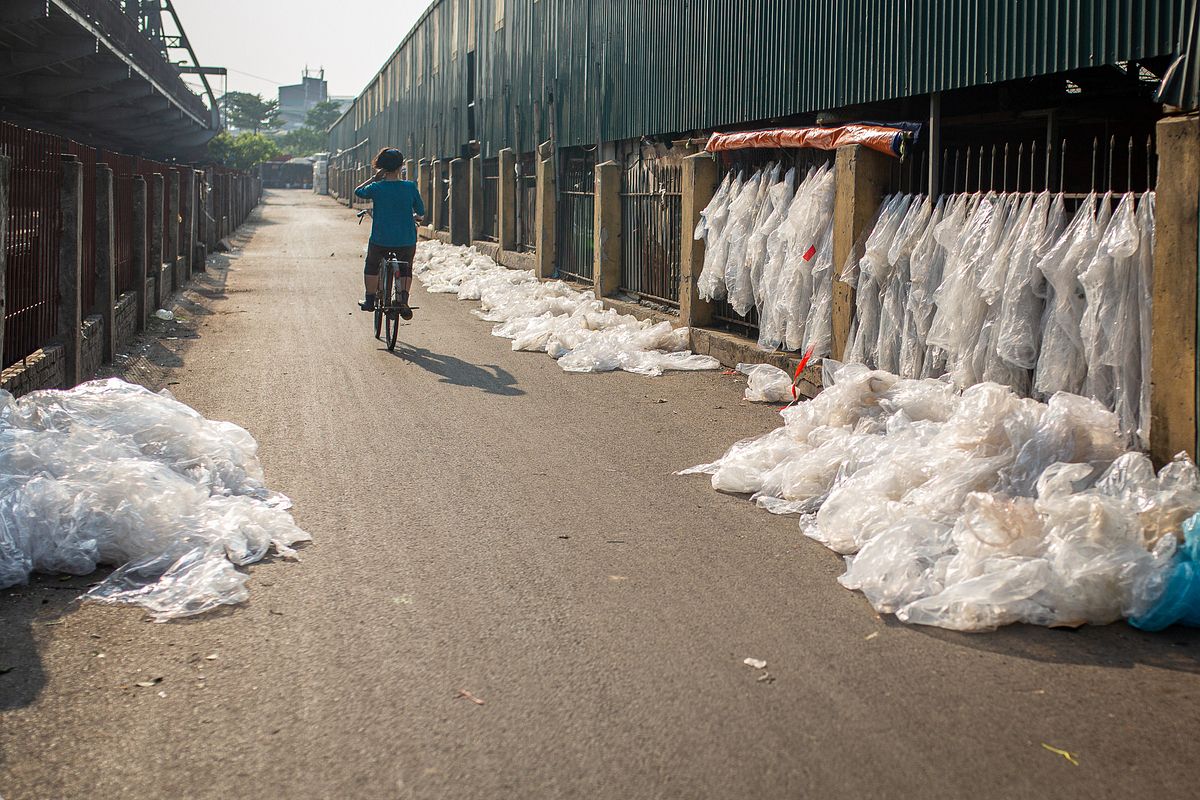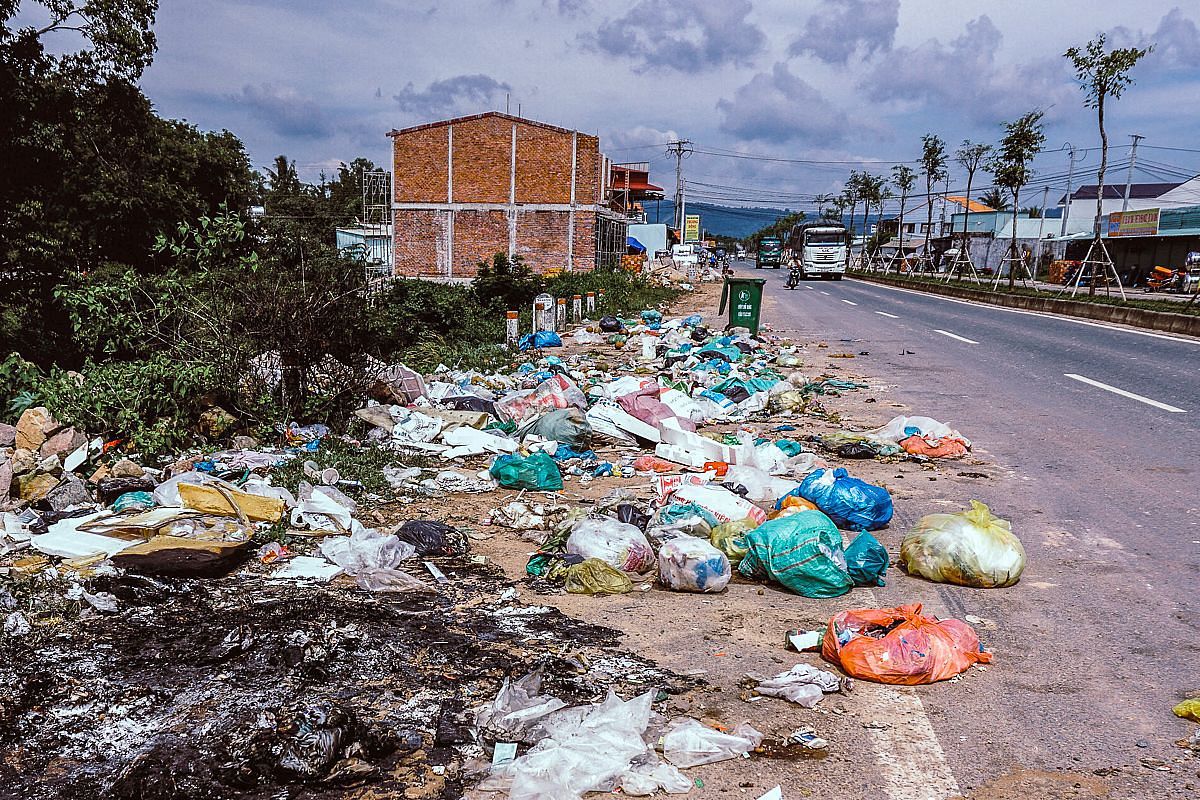Not all plastics are treated equally.
This may come as a surprise to those not involved in the waste-processing industry, whether at an industrial scale or on the hẻm level. Plastic waste created at the household level is relatively easy to collect and recycle, but once these items make it into the ocean, it becomes a much more difficult issue to address.
Such plastic can end up killing marine life and damaging ecosystems, and if it happens to wash up on shore somewhere, it is of little recyclable value.
Prior to such waste potentially reaching the sea, trash pickers in countries like Vietnam pick out items such as plastic bottles and polystyrene bags that can be sold to waste processing companies, generating income. The rest, however, is ignored.
It becomes, in the words of Barak Ekshtein, the founder of Tontoton, "orphan plastic."
Tontoton, based in Thu Duc City, aims to tackle this low-value plastic through its plastic neutralization program. They work with companies that produce goods that require plastic to offset this plastic production by removing an equal amount of plastic from the environment: a ton for a ton, if you will.

Packing collected plastic waste into bags for shipment to the mainland. Photo courtesy of Tontoton.
"So this is what drove us in the beginning: how to deal with low-value plastic which there is no market for before it reaches the ocean," Ekshtein said. "We knew we needed to work with waste pickers in local communities because if we could create a new market for low-value plastic, in addition to the plastic they are already collecting, then it becomes valuable for them and they can make a change."
Starting in early 2020, Tontoton partnered with WWF Vietnam, which runs a waste reduction program on Phu Quoc. Though popular with tourists, the island faces a huge waste problem, and its landfills are already at or approaching capacity. They began approaching waste pickers, though it wasn't easy at first.
"We tried explaining our idea to them, but it sounded really weird at first," Roxane Lauzet, sustainability compliance and marketing executive at Tontoton, said. "They wondered how they would be paid for their work if they collected non-recyclable plastic. It was a long process, but we did two pilot projects, so they saw the process and the payments coming in."
Tontoton also looked to Hon Son, a small island off the coast of Kien Giang Province.
"About 9,000 people live on Hon Son, and all of the waste they generate every day is sent to this cliff, and most of it is burned, because there is no other treatment method," Ekshtein said. "So the toxins are terrible, it's near a village, and a lot of plastic also gets blown into the ocean by the wind. It's not a good solution, and plastic will keep being generated, so mountains of waste continue to rise."

A waste collector on Hon Son. Photo courtesy of Tontoton.
With waste pickers on the two islands engaged, the plastic neutralization process works like this: a company partners with Tontoton to offset its plastic production; Tontoton then pays waste pickers to collect previously low-value plastic; this plastic is bagged and shipped to the mainland, and it is then trucked to an INSEE Ecocycle cement factory in Kien Giang which uses the plastic waste as energy.
This last step is known as co-processing. According to Geocycle, this "completely destroys waste materials through high temperatures; leaves no residue that needs to be landfilled, as the ash reacts with other components to form the manufactured final product; and reduces greenhouse gas emissions, as the waste is used to replace fossil fuels."
Pyrolysis requires temperatures around 2,000°C, extreme heat that only specialized facilities can create. It is different from incineration in that it does not require oxygen and changes the chemical composition of a substance instead of simply burning it off into the atmosphere.

Waste at the cement factory in Kien Giang. Photo courtesy of Tontoton.
I had never heard of this system before, but it has been recommended by the Basel Convention, the international treaty aimed at reducing the movement of hazardous waste around the world, as an environmentally friendly method of disposing of plastic waste.
"For now, we know it is the best solution for this kind of waste," Ekshtein shared. "Eventually, we get to reduce landfill capacity and the risk of plastic ending up in the ocean, and we reduce CO2 emissions as well, because the factory will use this waste instead of coal."
Ekshtein and Lauzet are also working to ensure that this system benefits local communities in the long run, though they also don't want this to be a permanent solution.
"What we're trying to do with our clients is to engage for a yearly contract so that every month we can tell the waste pickers and everyone else in the supply chain that it's not one project where they need to collect 10 tons and then it's finished," Ekshtein said. "It's 10 tons every month, so they know that they can rely on this for the year as income."
Lauzet added: "But we don't want companies to just come to us as an easy exit, we want them to look for recyclable materials in their production, we want them to look for a different approach and be here as part of their strategy. We hope there is a truly eco-friendly solution in the future, but for now this is what we can do to make a big change."
One year in, Tontoton's unique approach appears to be working. By working with people on Phu Quoc and Hon Son, they have collected seven tons of low-value plastic and have completed their pilot phase. They have also been certified by the Ocean Bound Plastic Neutrality Certification Program, created by the NGO Zero Plastic Oceans and the global certification group Control Union, becoming the first company in the world to receive such certification.


Ocean waste (left) and plastic packaged for shipment (right). Photos courtesy of Tontoton.
Word is spreading on both ends of the supply chain as well, with more companies and cement factories in other parts of Vietnam expressing interest in taking part in this waste neutralization, and waste pickers gaining interest as well.
"A very important thing that's happening is that when people start to hear that there is some crazy company that's paying for low-value plastic," Ekshtein said. "So they see low-value plastic on the beaches or where they live, and they know that if they gather it we'll collect it and pay them, so more and more areas open organically because word spreads and there is demand. It's good to see that process happening."
To be sure, seven tons of plastic is a drop in the proverbial bucket. Based on a 2015 Ocean Conservancy report, Vietnam is routinely cited as one of the five biggest contributors to plastic waste in the ocean. The Ministry of Natural Resources and Environment estimates that the country creates 1.8 million tons of plastic waste annually, 73% of which is not recycled.
But by engaging with local communities, Tontoton brings an oft-overlooked part of the waste reduction process into the picture, and the team believes they have a winning solution until real alternatives to plastic are introduced.
"We are part of global efforts to reduce the use of plastic," Ekshtein stated. "We need to keep thinking of different ways to do this and investing in ways to make it happen."















